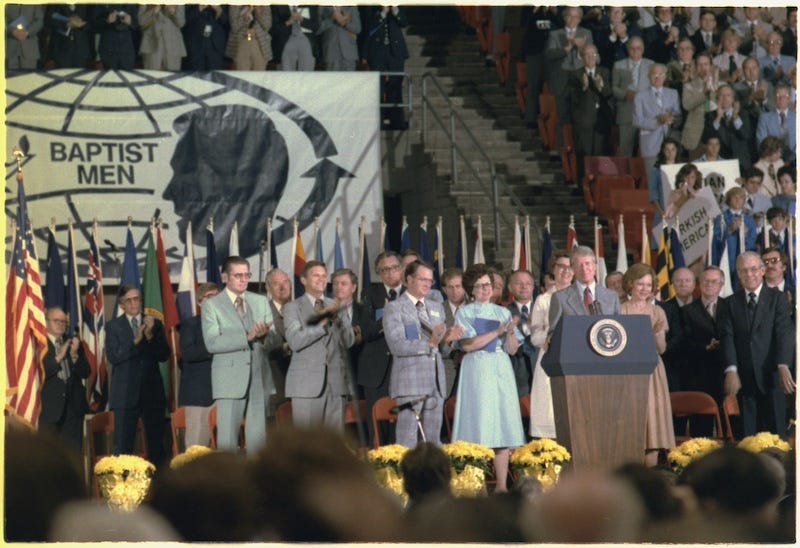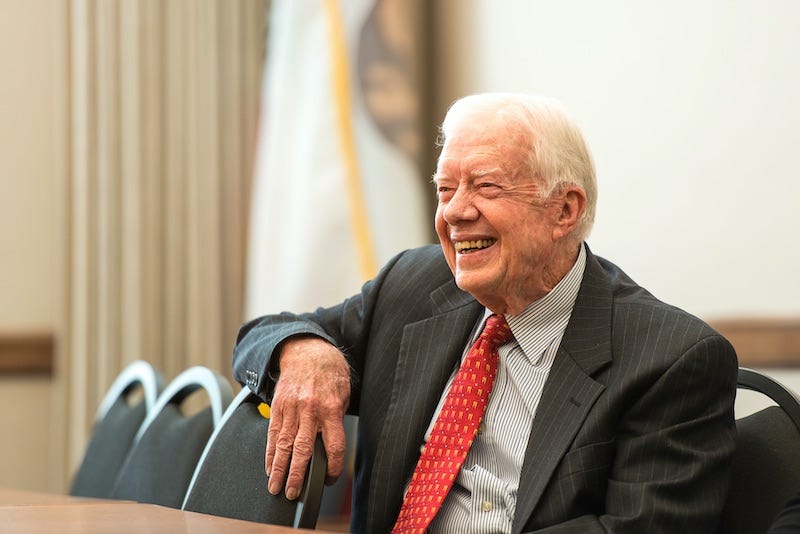Jimmy Carter, former Southern Baptist and 39th U.S. President, dies at 100
Carter appeared in a Home Mission Board Mission Service Corps video and spoke at the National Conference of Baptist Men.

Editor’s Note: This article has been updated from its original version, which stated Jimmy Carter was the first Southern Baptist U.S. President. Carter was one of several Baptists elected to the presidency, including Harry S. Truman, Bill Clinton, and others who identified as Baptists.
Jimmy Carter, the 39th U.S. president from 1977 to 1981, a Nobel Peace Prize laureate, and devout Baptist layman known for his charitable work and long-standing role as a Sunday school teacher at his home church, died Dec. 29 at age 100.
A member of Maranatha Baptist Church in Plains, Ga., Carter was a third-generation Southern Baptist and the first U.S. president to call himself a “born again” Christian. More than other modern U.S. presidents, Carter maintained close ties to a local church throughout his life. In 1991 he gave one of several interviews to the SBC Historical Commission detailing his faith.
“It was a part of my life like breathing – like being a Georgian or being a human being – to be part of a church life,” Carter told Bill Sumners of the Southern Baptist Historical Library and Archives in an interview published in the journal Baptist History and Heritage in 1997.
As a Southern Baptist, Carter maintained close ties to leaders in the denomination, and only a few months after winning the presidency appeared in a video presented at the SBC Annual Meeting championing the Mission Service Corps of the Home Mission Board. The following year Carter spoke at the National Conference of Baptist Men in Atlanta on June 16, 1978.
However, Carter eventually distanced himself from the Southern Baptist Convention (SBC) in 2000 when he expressed opposition to a revision of the Baptist Faith and Message doctrinal statement that added, “While both men and women are gifted for service in the church, the office of pastor is limited to men as qualified by Scripture.” In 2009, Carter sent a resignation letter to the convention citing what he described as the increasingly “rigid” views of the SBC.
“I have finally decided that, after 65 years, I can no longer be associated with the Southern Baptist Convention,” wrote Carter. “Our prayer is that we can avoid this divisive action, and adhere to the traditional beliefs that, for generations, have sustained our ancestors and us in a spirit of unity and cooperation.”
Later, Carter began identifying with the Mainline Protestant Cooperative Baptist Fellowship established following the SBC “conservative resurgence” of the late 1970s and 1980s.
It wasn’t only Southern Baptists that disagreed with Carter over theological matters. The Catholic Herald wrote that Carter “stood in contrast to Catholic teaching in many areas. A vocal proponent of the ordination of women to the priesthood, Carter described the Catholic Church’s decision to only ordain men as discriminating ‘against women in a very abusive fashion’”. Despite theological differences, in 1979 Carter welcomed Pope John Paul II to the White House, becoming the first US president to do so. “When the two met, they agreed to speak not as diplomats but as Christian brothers, with much of their conversation centering on human rights,” the Catholic Herald reported.
Mission Trip ‘Life-Changing’
In the 1960s Carter joined his pastor and a few other Baptist laymen on a mission trip to Pennsylvania where they spent a week visiting a hundred unchurched families.
“We had a wonderful religious experience working together,” Carter said, adding it was a life-changing experience and “the closest to Christ” he had ever felt.
Carter, who served as a trustee of the Baptist Brotherhood Commission, the now-defunct Southern Baptist mission entity for men and boys, mentioned his experience with Broadman Press and the Brotherhood in the article “From Politics to Poetics” written in 1995:
“Having studied typing and shorthand in high school, I did my own stenographic work on a portable typewriter during weekends at home. When it was finished, I called some small publishers in Georgia, none of whom would print the book. Finally, Broadman Press in Nashville looked at a few chapters and agreed to publish it,” Carter wrote. “They print all the Southern Baptist literature, and I had some influence with them as a member of the Baptists’ Brotherhood Commission. There was no thought of an author’s advance, but I received a percentage of the volumes printed. I gave these to potential political supporters and sold a few at my early political rallies.”
Carter maintained a close friendship with fellow Georgian Glendon McCullough, executive director of the Brotherhood Commission, until McCullough’s untimely death in a car accident in August 1978. McCullough and his second wife, Marjorie Jones, a Southern Baptist missionary to Brazil, were married in the governor’s mansion in Atlanta during Carter’s tenure, according to the Southern Baptist Historical Library and Archives. McCullough’s first wife had died of cancer.
Following McCullough’s death, Carter wrote to Mrs. Marjorie McCullough on August 25, 1978: “Rosalynn and I were deeply saddened to learn of the untimely death of our good friend, the Reverend Glendon McCullough. He was a wise and charitable man whose life and career exemplified the finest qualities of a man of God. For all of us whose lives he touched, Glendon McCullough cannot be replaced. We extend our deepest sympathy to Marjorie and the other members of his family.”
‘Progressive Evangelicalism’
The United States was a very different place politically in the 1970s when Carter ran and was elected president. It was a time when many Southern Baptists identified as Democrats and before the 1979 SBC conservative resurgence and the founding of the Moral Majority by Independent Baptist minister Jerry Falwell Sr.
While Carter was supported by many evangelicals, a comment in a Playboy magazine interview nearly cost him the Democratic presidential nomination, USA Today reported. Many voiced outrage at why Carter would sit for an interview with the men’s magazine that featured nude women and racy articles.
Responding to an interviewer’s question for the article that would be published weeks before the 1976 general election, Carter said, “I’ve committed adultery in my heart many times.”
“I am quite disillusioned,” Falwell told The Washington Post as recounted in the book, “Redeemer: The Life of Jimmy Carter” by Randall Balmer. Falwell and notable ministers criticized Carter’s interview with Playboy as an example of voicing impure thoughts.
“Four months ago, the majority of the people I knew were pro-Carter,” said Falwell. “Today, that has totally reversed.”
Support of Same-Sex Marriage, Abortion
In 2015, Carter told The New York Times that he believed Jesus would oppose abortion in most cases while supporting same-sex marriage. “I have never believed that Jesus would be in favor of abortion unless it was the result of rape or incest, or the mother's life was in danger,” Carter said. “Of course, Jesus never said anything about gay marriage in the Bible, but I believe he would be amenable to the union of two people who loved each other and didn't hurt anyone else.”
Regardless of Carter’s progressive leanings, evangelicals praised him as a decent and humble man who possibly was the most outwardly “Christian president” in United States history.
Sources:





💀💀💀
𝗧𝗛𝗘 𝗢𝗕𝗜𝗧𝗨𝗔𝗥𝗬 𝗢𝗙 𝗗𝗢𝗡𝗔𝗟𝗗 𝗝. 𝗧𝗥𝗨𝗠𝗣
𝗜𝗻 𝗦𝘁𝗮𝗿𝗸 𝗖𝗼𝗻𝘁𝗿𝗮𝘀𝘁 𝘁𝗼 𝗝𝗶𝗺𝗺𝘆 𝗖𝗮𝗿𝘁𝗲𝗿, 𝗮 𝗟𝗶𝗳𝗲 𝗼𝗳 𝗖𝗼𝗿𝗿𝘂𝗽𝘁𝗶𝗼𝗻, 𝗖𝗿𝘂𝗲𝗹𝘁𝘆, 𝗮𝗻𝗱 𝗖𝗵𝗮𝗼𝘀
“Donald John Trump, the twice-impeached, thrice-indicted 45th President of the United States, died on December 29, 2024, mere weeks before he was set to be sworn in for a catastrophic second term. His death, while tragic for those still entranced by his cult of personality, offers a much-needed reprieve for a nation and world terrorized by his existence. He was 78.” Read more…
https://open.substack.com/pub/patricemersault/p/the-obituary-of-donald-j-trump?r=4d7sow&utm_campaign=post&utm_medium=web&showWelcomeOnShare=false
I have fought a good fight, I have finished my course, I have kept the faith: henceforth there is laid up for me a crown of righteousness, which the Lord, the righteous judge, shall give me at that day: and not to me only, but unto all them also that love his appearing. - 2 Timothy 4:7